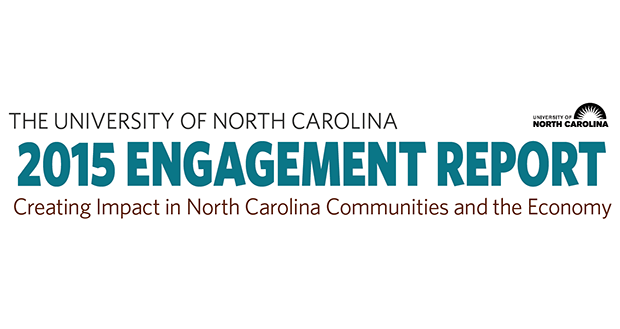In the past year, North Carolina’s public colleges and universities interacted with more than 6 million North Carolinians, reaching far beyond the 220,000 students enrolled in full-time studies.
That’s because the state’s public campuses are not isolated enclaves. Alongside teaching and research, public service is part of the University’s core mission, creating an expectation that students and faculty will engage in the civic, economic, and cultural life of the state.
“Being involved in communities across the state makes us better at everything we do,” said Leslie Boney, the UNC system’s vice president for international, community, and economic engagement . “It improves our teaching and learning, and it helps drive our research.”
That was among the key findings of the 2015 UNC Community and Economic Engagement Report presented last week to the system’s Board of Governors. The overview of the University’s statewide impact found that, in 2013-2014:
- More than 65,000 students were enrolled in applied learning courses, offering the opportunity to work with corporate, nonprofit, and government organizations outside the classroom as part of the University curriculum. These hands-on opportunities are increasing valued by employers and in high demand among students. “Employers want universities to prepare graduates ready to hit the ground running,” the report finds. Applied learning projects help answer that challenge.
- Our public universities offered more than 7,000 continuing education courses with more than 923,000 sign-ups, helping adult learners gain new skills and pursue intellectual interests.
- Faculty and students performed more than $300 million in health sciences research, $114 million in engineering projects, and an additional $87 million in agricultural studies. These targeted research investments help drive key industries, making North Carolina more competitive in job-generating sectors.
- The University’s Cooperative Extension Service, which takes agricultural know-how to all regions of the state, saw nearly 600,000 citizens participate in education and outreach programs.
- The University’s Area Health Education Centers (AHEC) trained or supported more than 280,000 doctors, nurses, and other health professionals in every region of the state.
The report also details university patent applications (232 filed in 2012-2013), research sponsored by local governments ($5.6 million in fiscal year 2014), and degrees awarded in health-care professions (more than 6,000 in 2014-2014).
“Done right, the work of a university on community and economic engagement creates a ripple effect throughout our state,” the report notes. “It ripples through the lives of people in our universities, as well.”
All figures from the UNC Community and Economics Engagement Report 2015, presented to the UNC-system Board of Governors, April 9, 2015. http://www.northcarolina.edu/sites/default/files/documents/economic_engagement_report_2015.pdf.
Reposted from the Higher Ed Works Foundation
